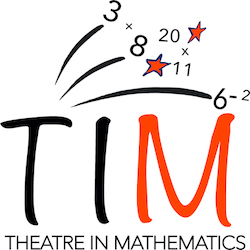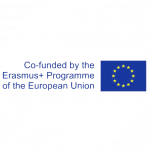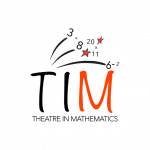The Project

Theatre In Mathematics | TIM
Nowadays mathematical competence and numeracy skills are considered to have a crucial role for self-fulfilment at both social and personal level, and to be a priority for educational cooperation at EU level (EACEA/Eurydice, 2011. Mathematics in Education in Europe: Common Challenges and National Policies. Bruxelles: EACEA P9 Eurydice). The common Math lesson is often characterized by the use of the textbook and by teachers dominating the conversation by asking questions and evaluating students. This pattern determines a passive attitude and frightened students. However, pedagogical research shows that a cooperative educational environment and an active involvement of students promote learning in the classroom. This happens especially when activities actively involve students and promote the development of life skills, thus allowing an increase in the perception of self-efficacy both relating to the personal sphere and the competences of the students (as we can observe in the SHE – School for Health in Europe Network).
TIM – Theatre in Mathematics is an Erasmus+ Strategic Partnership for School Education project, that created a new methodology – the TIM Methodology – to teach mathematics using the theatre workshop and drama, thus providing tools to overcome the obstacles teachers and learners in the EU face while teaching and learning Mathematics.
The project is carried out by COREP – Social and Community Theatre Centre of the University of Turin (IT), Western Norway University of applied Science – HVL (NO), Technical University of Crete (GR), ASTA theatre company (PT) and DORS – Regional centre of documentation for health promotion Piedmont (IT).
A New Methodology
The project developed the TIM Methodology by deepening and combining two existing approaches: “Mathemart – Playing with mathematics in the theatre workshop” and “Process Drama – change of roles, perspectives, and role aspects in teaching mathematics”.
Mathemart is a new approach that consists in teaching Mathematics through the Social and Community Theatre (SCT) methodology of the University of Turin. Mathemart uses SCT to get students involved in Mathematics by means of theatrical games and activities: an overall approach that includes mind and body, inborn creativity and engagement. This theatrical setting conveys a creative, playful and trusting atmosphere, enabling students to freely explore without judging what they are doing, learning from mistakes in a sequence of trial and error.
Process Drama, developed by the HVL University of Bergen, aims at changing the teacher dominated pattern of communication by introducing and exploring roles and role aspects (the sceptic, the curious, the authority, the mediator) to create more student active learning processes, emphasizing the ability to change roles and perspectives in a learning process with arguments more than just answers.
The TIM Methodology takes into account the 4 partner countries education systems in order to create a flexible and adaptable tool for each national and regional context. The TIM Methodology Manual describes the possibility of adjustment of TIM to any context or level of literacy of students within the range of 8 to 14 years old.
Project Outputs
Besides the TIM Methodology Manual, the intellectual outputs of the TIM Project are: the e-learning platform, the theatrical conference “MATH. SCARE. BOOM." and scientific articles. By accessing the TIM e-learning platform, users can find all the outputs of the project, to share and exchange digital learning resources related to the Methodology. The theatrical conference addresses the theme of the fear of Mathematics and has been created and performed in 4 languages for primary and secondary schools in 4 countries (Italy, Portugal, Greece and Norway). The 4 scientific articles analyse the TIM Methodology and the outcomes of the activities, inquiries and explorations carried out during the project.
The Target
The main target group of the project includes teachers and student teachers. An international group of 53 professionals from the field of Education received a specific TIM training to become TIM trainers, which enabled them to then work in schools side by side with Math teachers, to implement the Methodology with students in the classroom. This cooperation allowed the teachers involved in the project to learn the techniques of the TIM Methodology and become part of the TIM community also as co-creators of TIM materials. In fact, trainers and teachers working side by side implemented TIM by creating new lessons tailored on their groups of students. Then, they described these lessons and uploaded them on the e-learning platform, that collects lessons that have been and will be conducted and tested in schools. TIM trainers continue spreading the TIM Methodology in the 4 countries. In the implementation process, over 38 classes and approximately 800 students have been involved and the performance keeps touring and being staged for students in Europe in the 4 languages.
Other secondary and long-term targets such as institutions, existing projects and associations addressing Math teaching have been involved in the project and became part of the TIM community, and further collaborations sparked, such as the implementation of TIM training in Math Education Departments in Universities and collaboration with Drama in Education research institutions and organizations.
The E-Learning Platform
The e-learning platform is the virtual place where all the professionals and anyone who is interested in TIM can meet, exchange opinions and access materials using the repositories. It is the place where it is possible to share knowledge about TIM and about teaching Math throughout drama. The platform allows the creation of a community of professionals using TIM, exchanging knowledge, and spreading the methodology and the tools among their networks. The goal of the platform is to bring tangible enhancements in the classrooms by a virtuous cycle of professional knowledge sharing.


